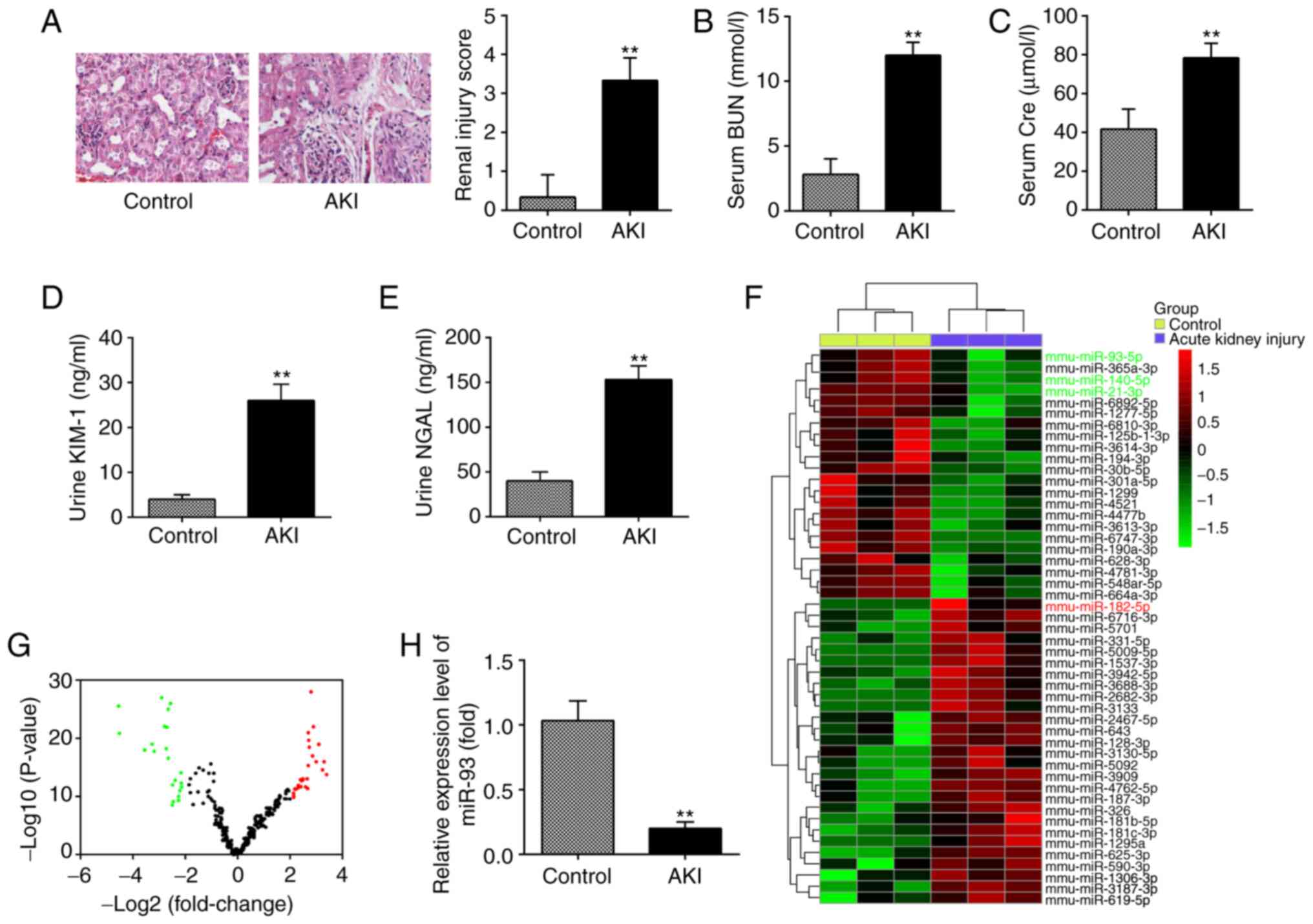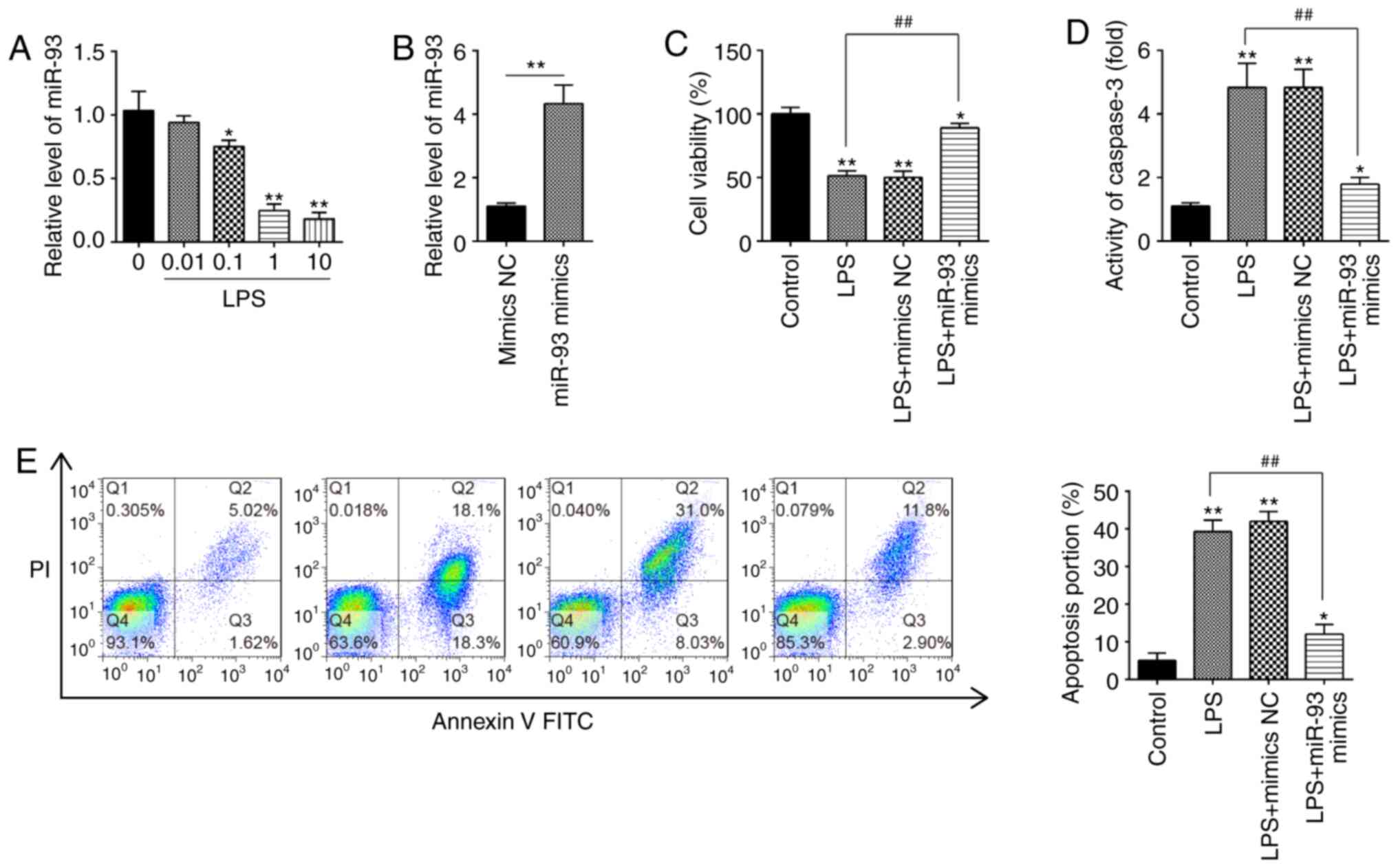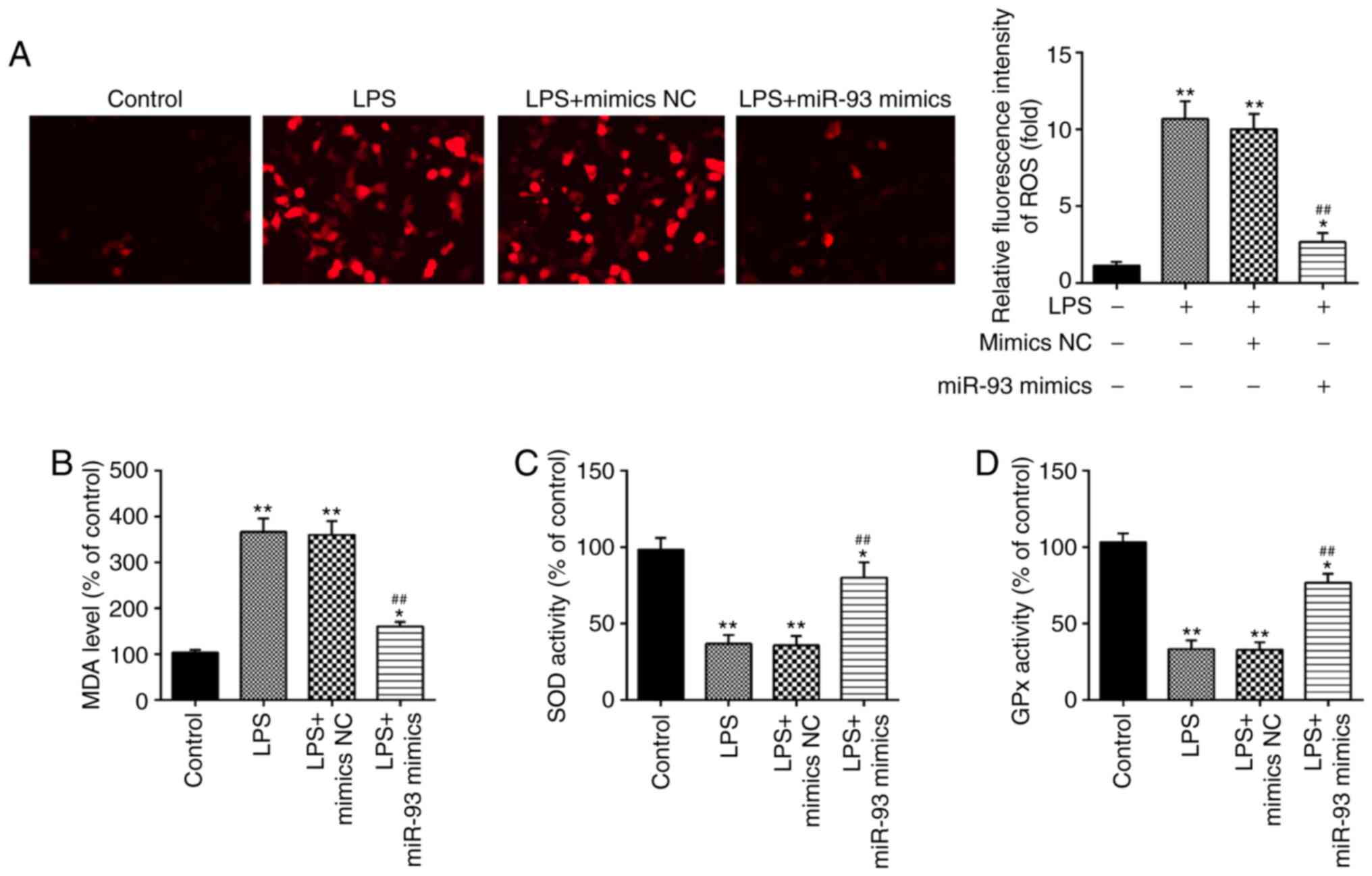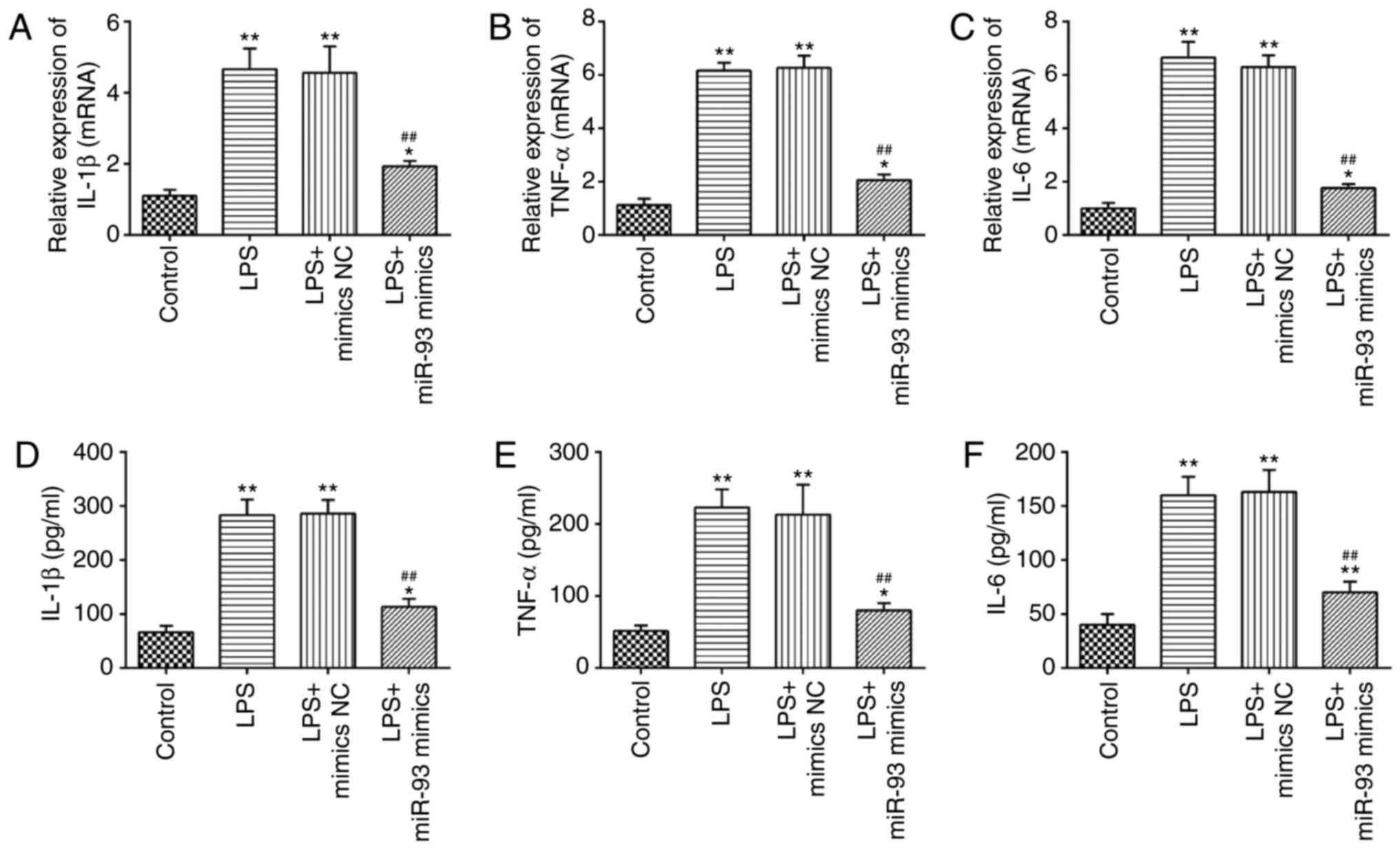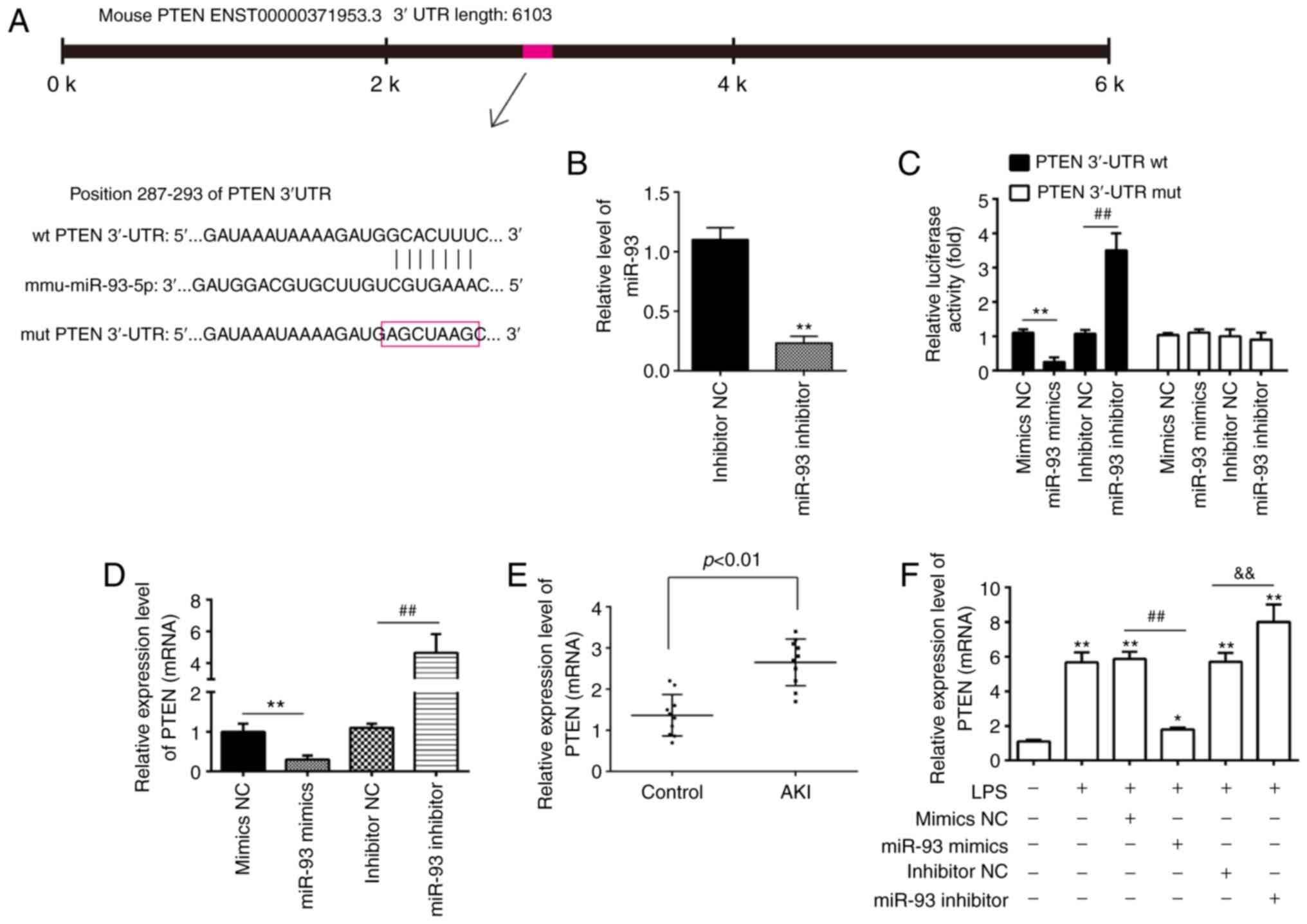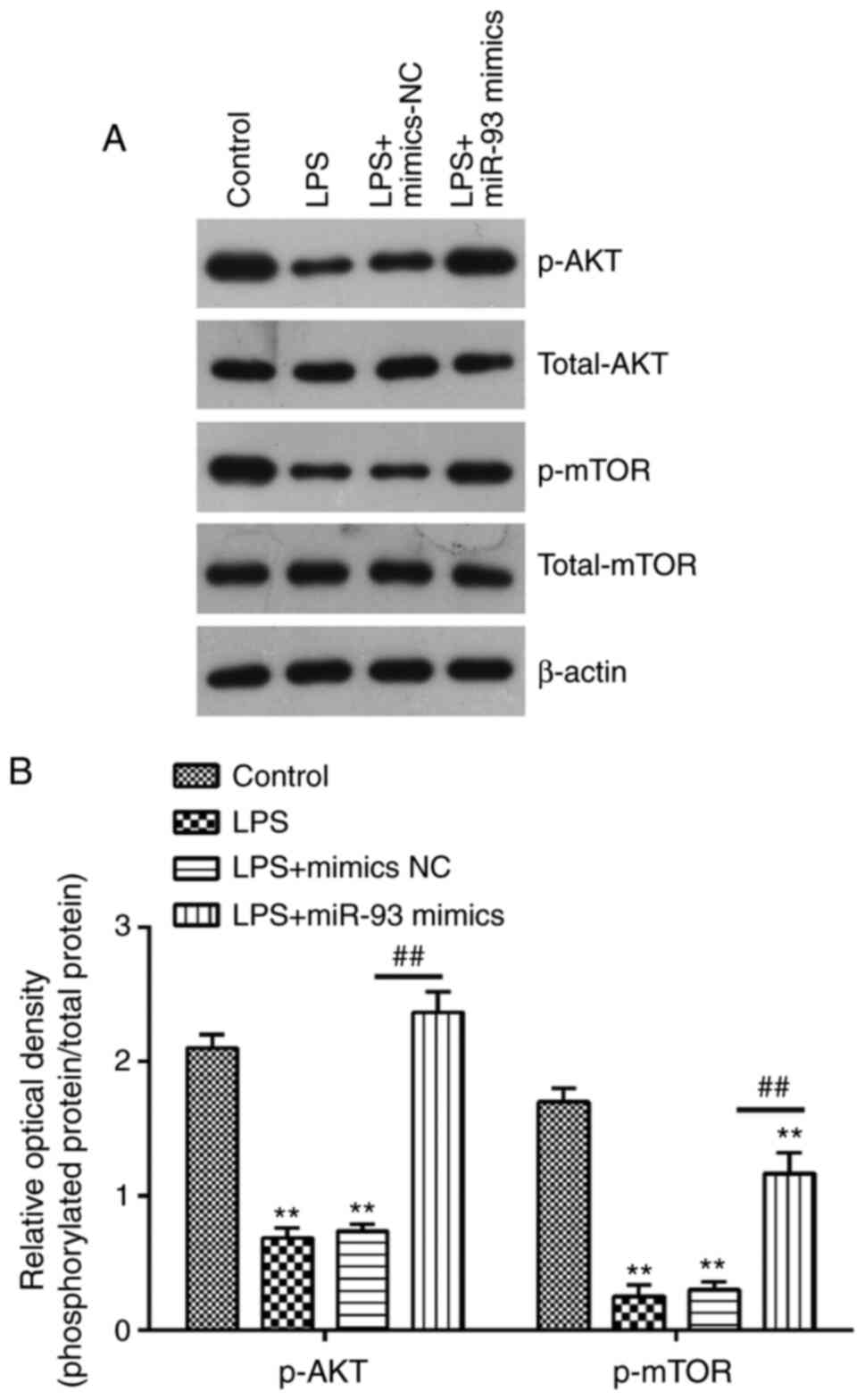|
1
|
Bonventre JV and Yang L: Cellular
pathophysiology of ischemic acute kidney injury. J Clin Invest.
121:4210–4221. 2011. View
Article : Google Scholar : PubMed/NCBI
|
|
2
|
Moreth K, Frey H, Hubo M, Zeng-Brouwers J,
Nastase MV, Hsieh LT, Haceni R, Pfeilschifter J, Iozzo RV and
Schaefer L: Biglycan-triggered TLR-2- and TLR-4-signaling
exacerbates the pathophysiology of ischemic acute kidney injury.
Matrix Biol. 35:143–151. 2014. View Article : Google Scholar : PubMed/NCBI
|
|
3
|
Sharfuddin AA and Molitoris BA:
Pathophysiology of ischemic acute kidney injury. Nat Rev Nephrol.
7:189–200. 2011. View Article : Google Scholar : PubMed/NCBI
|
|
4
|
Scharnweber T, Alhilali L and Fakhran S:
Contrast-induced acute kidney injury: Pathophysiology,
manifestations, prevention, and management. Magn Reson Imaging Clin
N Am. 25:743–753. 2017. View Article : Google Scholar : PubMed/NCBI
|
|
5
|
Peng X, Wang Y, Li H, Fan J, Shen J, Yu X,
Zhou Y and Mao H: ATG5-mediated autophagy suppresses NF-κB
signaling to limit epithelial inflammatory response to kidney
injury. Cell Death Dis. 10:2532019. View Article : Google Scholar : PubMed/NCBI
|
|
6
|
Zhi D, Zhang M, Lin J, Liu P and Duan M:
GPR120 ameliorates apoptosis and inhibits the production of
inflammatory cytokines in renal tubular epithelial cells.
Inflammation. 44:493–505. 2021. View Article : Google Scholar : PubMed/NCBI
|
|
7
|
Souza AC, Volpini RA, Shimizu MH, Sanches
TR, Camara NO, Semedo P, Rodrigues CE, Seguro AC and Andrade L:
Erythropoietin prevents sepsis-related acute kidney injury in rats
by inhibiting NF-κB and upregulating endothelial nitric oxide
synthase. Am J Physiol Renal Physiol. 302:F1045–F1054. 2012.
View Article : Google Scholar : PubMed/NCBI
|
|
8
|
Xie C, Liu L, Wang Z, Xie H, Feng Y, Suo
J, Wang M, Shang W and Feng G: Icariin improves sepsis-induced
mortality and acute kidney injury. Pharmacology. 102:196–205. 2018.
View Article : Google Scholar : PubMed/NCBI
|
|
9
|
Wang C, Sun H, Song Y, Ma Z, Zhang G, Gu X
and Zhao L: Pterostilbene attenuates inflammation in rat heart
subjected to ischemia-reperfusion: Role of TLR4/NF-kappaB signaling
pathway. Int J Clin Exp Med. 8:1737–1746. 2015.PubMed/NCBI
|
|
10
|
Thomson DW and Dinger ME: Endogenous
microRNA sponges: Evidence and controversy. Nat Rev Genet.
17:272–283. 2016. View Article : Google Scholar : PubMed/NCBI
|
|
11
|
Dragomir MP, Knutsen E and Calin GA:
SnapShot: Unconventional miRNA functions. Cell. 174:1038–1038.e1.
2018. View Article : Google Scholar : PubMed/NCBI
|
|
12
|
Ren GL, Zhu J, Li J and Meng XM: Noncoding
RNAs in acute kidney injury. J Cell Physiol. 234:2266–2276. 2019.
View Article : Google Scholar : PubMed/NCBI
|
|
13
|
Bhatt K, Mi QS and Dong Z: MicroRNAs in
kidneys: Biogenesis, regulation, and pathophysiological roles. Am J
Physiol Renal Physiol. 300:F602–F610. 2011. View Article : Google Scholar : PubMed/NCBI
|
|
14
|
Liao W, Fu Z, Zou Y, Wen D, Ma H, Zhou F,
Chen Y, Zhang M and Zhang W: MicroRNA-140-5p attenuated oxidative
stress in Cisplatin induced acute kidney injury by activating
Nrf2/ARE pathway through a Keap1-independent mechanism. Exp Cell
Res. 360:292–302. 2017. View Article : Google Scholar : PubMed/NCBI
|
|
15
|
Lan YF, Chen HH, Lai PF, Cheng CF, Huang
YT, Lee YC, Chen TW and Lin H: MicroRNA-494 reduces ATF3 expression
and promotes AKI. J Am Soc Nephrol. 23:2012–2023. 2012. View Article : Google Scholar : PubMed/NCBI
|
|
16
|
Wu R, Wu Y, Yang L, Deng Y and Chen D:
Value of serum level of microRNA-494 in predicting prognosis of
acute renal injury after cardiac surgery in children. Zhonghua Wei
Zhong Bing Ji Jiu Yi Xue. 31:1469–1473. 2019.(In Chinese).
PubMed/NCBI
|
|
17
|
Wang S, Zhang Z, Wang J and Miao H:
MiR-107 induces TNF-α secretion in endothelial cells causing
tubular cell injury in patients with septic acute kidney injury.
Biochem Biophys Res Commun. 483:45–51. 2017. View Article : Google Scholar : PubMed/NCBI
|
|
18
|
Lv LL, Feng Y, Wu M, Wang B, Li ZL, Zhong
X, Wu WJ, Chen J, Ni HF, Tang TT, et al: Exosomal miRNA-19b-3p of
tubular epithelial cells promotes M1 macrophage activation in
kidney injury. Cell Death Differ. 27:210–226. 2020. View Article : Google Scholar : PubMed/NCBI
|
|
19
|
Jiang L, Liu XQ, Ma Q, Yang Q, Gao L, Li
HD, Wang JN, Wei B, Wen J, Li J, et al: hsa-miR-500a-3P alleviates
kidney injury by targeting MLKL-mediated necroptosis in renal
epithelial cells. FASEB J. 33:3523–3535. 2019. View Article : Google Scholar : PubMed/NCBI
|
|
20
|
Guo Y, Ni J, Chen S, Bai M, Lin J, Ding G,
Zhang Y, Sun P, Jia Z, Huang S, et al: MicroRNA-709 mediates acute
tubular injury through effects on mitochondrial function. J Am Soc
Nephrol. 29:449–461. 2018. View Article : Google Scholar : PubMed/NCBI
|
|
21
|
Yan Y, Ma Z, Zhu J, Zeng M, Liu H and Dong
Z: MiR-214 represses mitofusin-2 to promote renal tubular apoptosis
in ischemic acute kidney injury. Am J Physiol Renal Physiol.
318:F878–F887. 2020. View Article : Google Scholar : PubMed/NCBI
|
|
22
|
Chen X, Zhang X, Xu J, Zhao Y, Bao J,
Zheng Z and Han J: AZD4547 attenuates lipopolysaccharide-induced
acute kidney injury by inhibiting inflammation: The Role of FGFR1
in renal tubular epithelial cells. Drug Des Devel Ther. 14:833–844.
2020. View Article : Google Scholar : PubMed/NCBI
|
|
23
|
Tang C, Han H, Yan M, Zhu S, Liu J, Liu Z,
He L, Tan J, Liu Y, Liu H, et al: PINK1-PRKN/PARK2 pathway of
mitophagy is activated to protect against renal
ischemia-reperfusion injury. Autophagy. 14:880–897. 2018.
View Article : Google Scholar : PubMed/NCBI
|
|
24
|
Mei LL, Wang WJ, Qiu YT, Xie XF, Bai J and
Shi ZZ: MiR-125b-5p functions as a tumor suppressor gene partially
by regulating HMGA2 in esophageal squamous cell carcinoma. PLoS
One. 12:e01856362017. View Article : Google Scholar : PubMed/NCBI
|
|
25
|
Livak KJ and Schmittgen TD: Analysis of
relative gene expression data using real-time quantitative PCR and
the 2(-Delta Delta C(T)) method. Methods. 25:402–408. 2001.
View Article : Google Scholar : PubMed/NCBI
|
|
26
|
Xu J, Ma X, Yu K, Wang R, Wang S, Liu R,
Liu H, Gao H, Yu K and Wang C: Lactate up-regulates the expression
of PD-L1 in kidney and causes immunosuppression in septic acute
renal injury. J Microbiol Immunol Infect. S1684-1182:30168–30169.
2019.(Epub ahead of print).
|
|
27
|
Song N, Zhang T, Xu X, Lu Z, Yu X, Fang Y,
Hu J, Jia P, Teng J and Ding X: MiR-21 protects against
ischemia/reperfusion-induced acute kidney injury by preventing
epithelial cell apoptosis and inhibiting dendritic cell maturation.
Front Physiol. 9:7902018. View Article : Google Scholar : PubMed/NCBI
|
|
28
|
Li H, Ma Y, Chen B and Shi J: MiR-182
enhances acute kidney injury by promoting apoptosis involving the
targeting and regulation of TCF7L2/Wnt/β-catenins pathway. Eur J
Pharmacol. 831:20–27. 2018. View Article : Google Scholar : PubMed/NCBI
|
|
29
|
Shihana F, Joglekar MV, Raubenheimer J,
Hardikar AA, Buckley NA and Seth D: Circulating human microRNA
biomarkers of oxalic acid-induced acute kidney injury. Arch
Toxicol. 94:1725–1737. 2020. View Article : Google Scholar : PubMed/NCBI
|
|
30
|
Xiong L, Yu KH and Zhen SQ: MiR-93 blocks
STAT3 to alleviate hepatic injury after ischemia-reperfusion. Eur
Rev Med Pharmacol Sci. 22:5295–5304. 2018.PubMed/NCBI
|
|
31
|
Wang P, Liang X, Lu Y, Zhao X and Liang J:
MicroRNA-93 downregulation ameliorates cerebral ischemic injury
through the Nrf2/HO-1 defense pathway. Neurochem Res. 41:2627–2635.
2016. View Article : Google Scholar : PubMed/NCBI
|
|
32
|
Shen Y, Yu J, Jing Y and Zhang J: MiR-106a
aggravates sepsis-induced acute kidney injury by targeting THBS2 in
mice model. Acta Cir Bras. 34:e2019006022019. View Article : Google Scholar : PubMed/NCBI
|
|
33
|
Zhu Y, Wei SW, Ding A, Zhu WP, Mai MF, Cui
TX, Yang H and Zhang H: The long noncoding RNA ANRIL promotes cell
apoptosis in lipopolysaccharide-induced acute kidney injury
mediated by the TLR4/nuclear factor-kappa B pathway. Kidney Blood
Press Res. 45:209–221. 2020. View Article : Google Scholar : PubMed/NCBI
|
|
34
|
Paller MS, Hoidal JR and Ferris TF: Oxygen
free radicals in ischemic acute renal failure in the rat. J Clin
Invest. 74:1156–1164. 1984. View Article : Google Scholar : PubMed/NCBI
|
|
35
|
Baliga R, Ueda N, Walker PD and Shah SV:
Oxidant mechanisms in toxic acute renal failure. Drug Metab Rev.
31:971–997. 1999. View Article : Google Scholar : PubMed/NCBI
|
|
36
|
Brezniceanu ML, Lau CJ, Godin N, Chénier
I, Duclos A, Ethier J, Filep JG, Ingelfinger JR, Zhang SL and Chan
JS: Reactive oxygen species promote caspase-12 expression and
tubular apoptosis in diabetic nephropathy. J Am Soc Nephrol.
21:943–954. 2010. View Article : Google Scholar : PubMed/NCBI
|
|
37
|
Li GS, Chen XL, Zhang Y, He Q, Wang F,
Hong DQ, Zhang P, Pu L, Zhang Y, Yang XC and Wang L: Malnutrition
and inflammation in acute kidney injury due to earthquake-related
crush syndrome. BMC Nephrol. 11:42010. View Article : Google Scholar : PubMed/NCBI
|
|
38
|
Yang P, Peairs JJ, Tano R and Jaffe GJ:
Oxidant-mediated Akt activation in human RPE cells. Invest
Ophthalmol Vis Sci. 47:4598–4606. 2006. View Article : Google Scholar : PubMed/NCBI
|
|
39
|
Byeon SH, Lee SC, Choi SH, Lee HK, Lee JH,
Chu YK and Kwon OW: Vascular endothelial growth factor as an
autocrine survival factor for retinal pigment epithelial cells
under oxidative stress via the VEGF-R2/PI3K/Akt. Invest Ophthalmol
Vis Sci. 51:1190–1197. 2010. View Article : Google Scholar : PubMed/NCBI
|
|
40
|
Skrypnyk NI, Voziyan P, Yang H, de
Caestecker CR, Theberge MC, Drouin M, Hudson B, Harris RC and de
Caestecker MP: Pyridoxamine reduces postinjury fibrosis and
improves functional recovery after acute kidney injury. Am J
Physiol Renal Physiol. 311:F268–F277. 2016. View Article : Google Scholar : PubMed/NCBI
|
|
41
|
Zager RA, Johnson AC and Becker K: Acute
unilateral ischemic renal injury induces progressive renal
inflammation, lipid accumulation, histone modification, and
‘end-stage’ kidney disease. Am J Physiol Renal Physiol.
301:F1334–F1345. 2011. View Article : Google Scholar : PubMed/NCBI
|
|
42
|
Gall JM, Wong V, Pimental DR, Havasi A,
Wang Z, Pastorino JG, Bonegio RG, Schwartz JH and Borkan SC:
Hexokinase regulates Bax-mediated mitochondrial membrane injury
following ischemic stress. Kidney Int. 79:1207–1216. 2011.
View Article : Google Scholar : PubMed/NCBI
|
|
43
|
Lee HT, Park SW, Kim M, Ham A, Anderson
LJ, Brown KM, D'Agati VD and Cox GN: Interleukin-11 protects
against renal ischemia and reperfusion injury. Am J Physiol Renal
Physiol. 303:F1216–F1224. 2012. View Article : Google Scholar : PubMed/NCBI
|
|
44
|
Schrier RW and Wang W: Acute renal failure
and sepsis. N Engl J Med. 351:159–169. 2004. View Article : Google Scholar : PubMed/NCBI
|
|
45
|
Saikumar J, Hoffmann D, Kim TM, Gonzalez
VR, Zhang Q, Goering PL, Brown RP, Bijol V, Park PJ, Waikar SS and
Vaidya VS: Expression, circulation, and excretion profile of
microRNA-21, −155, and −18a following acute kidney injury. Toxicol
Sci. 129:256–267. 2012. View Article : Google Scholar : PubMed/NCBI
|
|
46
|
Szeto CC, Ching-Ha KB, Ka-Bik L, Mac-Moune
LF, Cheung-Lung CP, Gang W, Kai-Ming C and Kam-Tao LP: Micro-RNA
expression in the urinary sediment of patients with chronic kidney
diseases. Dis Markers. 33:137–144. 2012. View Article : Google Scholar : PubMed/NCBI
|
|
47
|
Chen W, Ruan Y, Zhao S, Ning J, Rao T, Yu
W, Zhou X, Liu C, Qi Y and Cheng F: MicroRNA-205 inhibits the
apoptosis of renal tubular epithelial cells via the PTEN/Akt
pathway in renal ischemia-reperfusion injury. Am J Transl Res.
11:7364–7375. 2019.PubMed/NCBI
|
|
48
|
Wu H, Huang T, Ying L, Han C, Li D, Xu Y,
Zhang M, Mou S and Dong Z: MiR-155 is involved in renal
ischemia-reperfusion injury via direct targeting of FoxO3a and
regulating renal tubular cell pyroptosis. Cell Physiol Biochem.
40:1692–1705. 2016. View Article : Google Scholar : PubMed/NCBI
|
|
49
|
Li H, Zhu X, Zhang J and Shi J:
MicroRNA-25 inhibits high glucose-induced apoptosis in renal
tubular epithelial cells via PTEN/AKT pathway. Biomed Pharmacother.
96:471–479. 2017. View Article : Google Scholar : PubMed/NCBI
|
|
50
|
Qu XH and Zhang K: MiR-122 regulates cell
apoptosis and ROS by targeting DJ-1 in renal ischemic reperfusion
injury rat models. Eur Rev Med Pharmacol Sci. 22:8830–8838.
2018.PubMed/NCBI
|
|
51
|
Ma SX, Bai ZF, Wang W and Wu HY: Effects
of microrna-93 on mouse cardiac microvascular endothelial cells
injury and inflammatory response by mediating SPP1 through the
NF-ΚB pathway. J Cell Biochem. 120:2847–2858. 2019. View Article : Google Scholar : PubMed/NCBI
|
|
52
|
Yan LJ, Fan XW, Yang HT, Wu JT, Wang SL
and Qiu CG: MiR-93 inhibition ameliorates OGD/R induced
cardiomyocyte apoptosis by targeting Nrf2. Eur Rev Med Pharmacol
Sci. 21:5456–5461. 2017.PubMed/NCBI
|
|
53
|
Gao S, Zhu Y, Li H, Xia Z, Wu Q, Yao S,
Wang T and Yuan S: Remote ischemic postconditioning protects
against renal ischemia/reperfusion injury by activation of
T-LAK-cell-originated protein kinase (TOPK)/PTEN/Akt signaling
pathway mediated anti-oxidation and anti-inflammation. Int
Immunopharmacol. 38:395–401. 2016. View Article : Google Scholar : PubMed/NCBI
|
|
54
|
Zhang W, Chen C, Jing R, Liu T and Liu B:
Remote ischemic preconditioning protects cisplatin-induced acute
kidney injury through the PTEN/AKT signaling pathway. Oxid Med Cell
Longev. 2019:76293962019. View Article : Google Scholar : PubMed/NCBI
|
|
55
|
Ke ZP, Xu P, Shi Y and Gao AM: MicroRNA-93
inhibits ischemia-reperfusion induced cardiomyocyte apoptosis by
targeting PTEN. Oncotarget. 7:28796–28805. 2016. View Article : Google Scholar : PubMed/NCBI
|
|
56
|
Zhong J, Qiu X, Yu Q, Chen H and Yan C: A
novel polysaccharide from Acorus tatarinowii protects against
LPS-induced neuroinflammation and neurotoxicity by inhibiting
TLR4-mediated MyD88/NF-κB and PI3K/Akt signaling pathways. Int J
Biol Macromol. 163:464–475. 2020. View Article : Google Scholar : PubMed/NCBI
|
|
57
|
Liu F, Huang X, He JJ, Song C, Peng L,
Chen T and Wu BL: Plantamajoside attenuates inflammatory response
in LPS-stimulated human gingival fibroblasts by inhibiting PI3K/AKT
signaling pathway. Microb Pathog. 127:208–211. 2019. View Article : Google Scholar : PubMed/NCBI
|
|
58
|
Meng L, Li L, Lu S, Li K, Su Z, Wang Y,
Fan X, Li X and Zhao G: The protective effect of dexmedetomidine on
LPS-induced acute lung injury through the HMGB1-mediated TLR4/NF-κB
and PI3K/Akt/mTOR pathways. Mol Immunol. 94:7–17. 2018. View Article : Google Scholar : PubMed/NCBI
|
|
59
|
Liu HB, Meng QH, Huang C, Wang JB and Liu
XW: Nephroprotective effects of polydatin against
ischemia/reperfusion injury: A role for the PI3K/Akt signal
pathway. Oxid Med Cell Longev. 2015:3621582015. View Article : Google Scholar : PubMed/NCBI
|
|
60
|
Yingjie K, Haihong Y, Lingwei C, Sen Z,
Yuanting D, Shasha C, Liutong P, Ying W and Min Z: Apoptosis
repressor with caspase recruitment domain deficiency accelerates
ischemia/reperfusion (I/R)-induced acute kidney injury by
suppressing inflammation and apoptosis: The role of AKT/mTOR
signaling. Biomed Pharmacother. 112:1086812019. View Article : Google Scholar : PubMed/NCBI
|
|
61
|
Zhang G, Wang Q, Wang W, Yu M, Zhang S, Xu
N, Zhou S, Cao X, Fu X, Ma Z, et al: Tempol protects against acute
renal injury by regulating PI3K/Akt/mTOR and GSK3β signaling
cascades and afferent arteriolar activity. Kidney Blood Press Res.
43:904–913. 2018. View Article : Google Scholar : PubMed/NCBI
|















